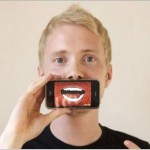With more and more reports out now on how to encrypt your data, it’s fascinating that experts continue to miss the mark. Though electronic data is all the rage now, the practice of law is all about yakking. And when you yak, your lips move. And when your lips move, people can read them, as in “I think he just said he’s constipated.” With lip-reading at an all-time high, it’s perplexing that law practice gurus have not offered solid advice on how to encrypt your lips. Until now. Here are our top four resources for assuring that no one can read your lips, even if you are raising taxes.
Encryption Cones
 The movie “Up” popularized the notion of the “cone of shame,” a cone that hung around Doug, the dog at the low-end of the pack. That’s unfortunate, as sales of lip-reading encryption cones have since plummeted. But they remain one of the most effective ways to protect your lips from being read, other than investing in the privy tent we highlighted some time ago. Lip-reading encryption cones are lightweight, portable, and can be slipped on quickly when you receive a cell phone call from a client or need to discuss a matter with a client at a coffee shop or NASCAR event. We recommend, however, that you carry two: one for you and one for the client. Dual-core lip-reading encryption cones provide exceptional protection for your sensitive client data.
The movie “Up” popularized the notion of the “cone of shame,” a cone that hung around Doug, the dog at the low-end of the pack. That’s unfortunate, as sales of lip-reading encryption cones have since plummeted. But they remain one of the most effective ways to protect your lips from being read, other than investing in the privy tent we highlighted some time ago. Lip-reading encryption cones are lightweight, portable, and can be slipped on quickly when you receive a cell phone call from a client or need to discuss a matter with a client at a coffee shop or NASCAR event. We recommend, however, that you carry two: one for you and one for the client. Dual-core lip-reading encryption cones provide exceptional protection for your sensitive client data.
Virtual Mouths
 When concerns over lip-reading erupted at LegalTech Show New York 2010, lip-reading encryption vendors sprang into action and created a new cottage industry now known as Lip-Reading Virtual Mouth Encryption. Now, you can download and install at least a dozen virtual mouth apps, all of which provide a decent level of encryption when you hold it up to your mouth and start talking. If you go the route of a virtual mouth app such as Crazy Mouth, Mouth Off, or Hillbilly Mouth, make sure it uses at least AES or Twofish cipher and that the mouth animation uses suitable encryption hash algorithm motions. Cut corners with lip-reading encryption on an app and you’ve basically given up any protection and, honestly, you look like a massive goob.
When concerns over lip-reading erupted at LegalTech Show New York 2010, lip-reading encryption vendors sprang into action and created a new cottage industry now known as Lip-Reading Virtual Mouth Encryption. Now, you can download and install at least a dozen virtual mouth apps, all of which provide a decent level of encryption when you hold it up to your mouth and start talking. If you go the route of a virtual mouth app such as Crazy Mouth, Mouth Off, or Hillbilly Mouth, make sure it uses at least AES or Twofish cipher and that the mouth animation uses suitable encryption hash algorithm motions. Cut corners with lip-reading encryption on an app and you’ve basically given up any protection and, honestly, you look like a massive goob.
Le Mustache
While initially considered a male-dominated encryption solution, mustaches are making huge inroads, even among female lawyers and paralegals, who surprisingly have also advanced more quickly in firms once they adopted mustachioed encryption techniques. A properly groomed and grown mustache can easily hide the upper lip, one of the critical components required for reading lips. Mustache extensions are also a growing niche legal accessory for those who cannot seem to manage simple “lip-encryption overgrowth,” the standard descriptor used to describe mustachioed approaches.
Ventriloquism
 We have not investigated this method in a lot of detail, other then to report that, as enrollment in law schools skyrocketed in the last few years, so did enrollment in ventriloquism classes and seminars. It’s now a standard annual CLE offered by most accredited CLE providers. While it takes a significant amount of training (and thus a lower number of lawyers who use it), once trained you have an inexpensive lip-reading encryption solution built in to your mouth. We have also heard, though anecdotally, that skilled ventriloquist lawyers are in higher demand for trial work, particularly if they are able to “throw” their voice and make witnesses appear to make damaging statements.
We have not investigated this method in a lot of detail, other then to report that, as enrollment in law schools skyrocketed in the last few years, so did enrollment in ventriloquism classes and seminars. It’s now a standard annual CLE offered by most accredited CLE providers. While it takes a significant amount of training (and thus a lower number of lawyers who use it), once trained you have an inexpensive lip-reading encryption solution built in to your mouth. We have also heard, though anecdotally, that skilled ventriloquist lawyers are in higher demand for trial work, particularly if they are able to “throw” their voice and make witnesses appear to make damaging statements.

If you decide to pursue ventriloquism, make sure you find a friend to do it for you whenever your client is talking to the opposing party. Wouldn’t want to violate PR Rule 4.2, which prohibits lawyers scripting communications. You could organize a group of attorneys willing to swap ventriloquism services in such circumstances.